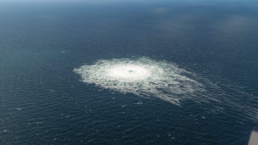Washington has made it clear for years that it doesn’t want the Nord Stream pipeline.
By Bryce Greene, FAIR.org
Multiple explosions last week off the coast of Poland damaged both the Nord Stream 1 and Nord Stream 2 pipelines, shutting down one and preventing the other from going online. The pipelines, intended to carry natural gas from Russia to Germany, are critical infrastructure for Europe’s energy markets.

The explosions triggered a lopsided “whodunnit” in US media, with commentators almost universally fingering Russia as the culprit, despite the lack of a plausible motive. Official US opposition to the pipeline has been well-established over the years, giving Washington ample motive to destroy the pipelines, but most newsrooms uniformly suppressed this history, and attacked those who raised it.
After the explosions, much of the press dutifully parroted the Western official line. The Washington Post (9/27/22) quickly produced an account: “European Leaders Blame Russian ‘Sabotage’ After Nord Stream Explosions,” citing nothing but EU officials who claimed that while they had no evidence of Russian involvement, “only Russia had the motivation, the submersible equipment and the capability.”
Much of the media cast their suspicions towards Russia, including Bloomberg (9/27/22), Vox (9/29/22), Associated Press (9/30/22) and much of cable news. With few exceptions, speculation on US involvement has seemingly been deemed an intellectual no-fly-zone.
The idea that only Russia had the means and motivation is clearly false on both counts. Washington has made it clear for years that it doesn’t want the pipeline, and has taken active measures to stop it from coming online. As for the means, it’s patently absurd to suggest that the US doesn’t have the capability to lay explosives in 200 feet of water.
Even Max Boot, who agreed in his Washington Post column (9/29/22) that only Russia had the means and motive, contradictorily acknowledged that “the means are easy.”
A long history of opposition
Any serious coverage of the Nord Stream attack should acknowledge that opposition to the pipeline has been a centerpiece of the US grand strategy in Europe. The long-term goal has been to keep Russia isolated and disjointed from Europe, and to keep the countries of Europe tied to US markets. Ever since German and Russian energy companies signed a deal to begin development on Nord Stream 2, the entire machinery of Washington has been working overtime to scuttle it.
A 2019 Pentagon-funded study from the RAND Corporation on how best to exploit “Russia’s economic, political and military vulnerabilities and anxieties” included a recommendation to “Reduce [Russian] Natural Gas Exports and Hinder Pipeline Expansions.” The study noted that a “first step would involve stopping Nord Stream 2,” and that natural gas “from the United States and Australia could provide a substitute.”
This RAND study also prophetically recommended “providing more US military equipment and advice” to Ukraine in order to “lead Russia to increase its direct involvement in the conflict and the price it pays for it,” even though it acknowledged that “Russia might respond by mounting a new offensive and seizing more Ukrainian territory.”
The Obama administration opposed the pipeline. As part of the major sanctions package against Russia in 2017, the Trump administration began sanctioning any company doing work on the pipeline. The move generated outrage in Germany, where many saw it as an attempt to meddle with European markets. In 2019, the US implemented more sanctions on the project.
Upon coming into office, President Joe Biden made opposition to the pipeline one of his administration’s top priorities. During his confirmation hearings in 2021, Secretary of State Anthony Blinken told Congress he was “determined to do whatever I can to prevent” Nord Stream 2 from being completed. Months later, the State Department reiterated that “any entity involved in the Nord Stream 2 pipeline risks US sanctions and should immediately abandon work on the pipeline.”
In July 2021, the sanctions were relaxed only after contentious negotiations with the German government. The New York Times (7/21/21) reported that the administration and Germany still had “profound disagreements” about the project.
As Russia was gathering troops at Ukraine’s border at the beginning of this year, US administration officials issued threats against the pipeline’s operation in the event of a Russian invasion. In January, Undersecretary of State Victoria Nuland — one of the main players during the 2014 Maidan Coup in Ukraine and wife of Robert Kagan, the founder of the neoconservative Project for a New American Century — issued a stern warning against the pipeline. “If Russia invades, one way or another, Nord Stream 2 Will. Not. Move. Forward.”
In February, Joe Biden himself told reporters, “If Russia invades…then there will be no longer a Nord Stream 2. We will bring an end to it.” After a reporter asked how the US planned to end a project that was under German control, Biden responded, “I promise you, we will be able to do that.”
On February 22, after Russian troops were given orders to enter the Donbas region in eastern Ukraine, Germany suspended the pipeline, in a move that was called “remarkable” at the time (New York Times, 2/22/22).
In sharp contrast to the US’s antagonism, Russia has taken the opposite approach to the pipeline it spent billions of dollars to complete. As recently as three weeks ago, Putin expressed willingness to supply more gas if the EU would lift the sanctions against the newer pipeline. He said: “If things are so bad, just go ahead and lift sanctions against Nord Stream 2, with its 55 billion cubic meters per year — all they have to do is press the button and they will get going.” Diplomatic sources told the Cradle (9/29/22) that Russia and Germany were in talks about both NS1 and NS2 on the day of the explosion.
The day after the attack, German government sources leaked to the German daily Der Spiegel (9/28/22) that weeks earlier, the CIA warned Germany of a potential attack on the pipeline. However, sources told CNN (9/29/22) that the warnings were “vague” and that “it was not clear from the warnings who might be responsible for any attacks on the pipelines, or when they might occur.” A high-level source in German intelligence told the Cradle (9/29/22) that they were “furious” because “they were not in the loop.”
After the attack, Blinken called the bombing a “tremendous opportunity to once and for all remove the dependence on Russian energy,” and said that this “offers tremendous strategic opportunity for years to come.” On the other hand, Russia has already announced plans to begin repairing the pipeline.
So contrary to what nearly the US entire media establishment has presented, the US has had ample motive to destroy the pipeline, and is actively celebrating its demise.
‘Thank you, USA’
One event that fueled speculation of US involvement was a tweet from a Polish member of the European Parliament, Radek Sikorski—a one-time Polish Defense minister as well as a former American Enterprise Institute fellow, who was named one of the “Top 100 Global Thinkers” in 2012 by Foreign Policy (11/26/12).
Sikorski tweeted out a picture of the methane leak in the ocean, along with the caption, “As we say in Polish, a small thing, but so much joy.” He later tweeted, “Thank you, USA,” with the same picture.
He later tweeted against the pipeline, noting that “Nord Stream’s only logic was for Putin to be able to blackmail or wage war on Eastern Europe with impunity.” An hour later he elaborated:
Now $20 billion of scrap metal lies at the bottom of the sea, another cost to Russia of its criminal decision to invade Ukraine. Someone…did a special maintenance operation.
The last line was a joke about how Russia classifies its invasion of Ukraine as a “special military operation.”
After these tweets received attention from those who suspected US responsibility, Sikorski deleted them. Business Insider (9/30/22) dishonestly wrote that these latter tweets were actually an “attempt to clarify that the original tweet was a criticism of US support for the pipeline being built in the first place.” Any honest reading of the tweets demonstrates that the opposite is true; presumably this is why Insider didn’t link to any specific text.
The Washington Post (9/28/22) also offered a twisted interpretation of Sikorski’s tweets:
His meaning wasn’t entirely clear; it seems possible he was crediting the United States with rendering the pipelines moot by pressuring Europe not to take Russian natural gas. In later tweets, he seemed actually to point to Russian sabotage.
For the latter claim, the Post cited Sikorski’s joke about the “special maintenance operation,” but the full tweet shows that this is a preposterous interpretation.
While certainly not a smoking gun, such a high-profile accusation (or expression of gratitude, such as it was) raises eyebrows, especially given Poland’s strenuous opposition to the pipeline, and the recent completion of a Norway/Poland pipeline designed to “cut dependency on Russia.” The circumstances are even more suspicious, given that Sikorski is the husband of the fervently anti-Russian staff writer at The Atlantic Anne Applebaum, who has been a key media figure advancing the pro-NATO narrative in the West.
Applebaum even sits on the board of the National Endowment for Democracy (a position she once shared with Victoria Nuland before Nuland moved into the Biden administration), a government-funded conduit for US regime change and destabilization projects that was an important driving force behind the 2014 coup that replaced Ukraine’s pro-Russian government with a Pro-Western one. Since then, the NED has funded English-language Ukrainian media like the Kyiv Independent, which, along with commentators like Applebaum herself, are now shaping coverage of the current war for Western audiences.
The fact that someone as connected as Sikorski would find it appropriate to publicly thank the US for the attack certainly deserves scrutiny. Some US media brought up the tweet, but dismissed it as unimportant (The Hill, 9/30/22).
‘A reminder from Moscow’
US media have all but ignored the critical context above. If a case like that existed for the Russia-did-it theory, you can be sure that it would have been spelled out in detail by everyone. But instead, US media direct attention away from the obvious and are left to grasp at straws to find a potential Russian motive. In fact, many outlets readily acknowledged that there was no obvious motive for Russia to bomb its own pipeline. For example, the New York Times (9/28/22) wrote:
It is unclear why Moscow would seek to damage installations that cost Gazprom billions of dollars to build and maintain. The leaks are expected to delay any possibility of receiving revenue from fuel going through the pipes.
Vox (9/28/22) reported that “experts emphasized…it may be hard to fully know Moscow’s motivation.” NPR (9/28/22) also couldn’t readily answer “the question as to why Russia would attack its own pipelines.”
Having admitted that Russia has no readily apparent motive, establishment media are left to stretch. They presented a couple of theories for Putin’s potential motivation, but neither holds up to scrutiny. One, per the Times (9/28/22), is that the leaks “may help Russia by pushing energy prices higher,” since “the natural gas market is spooked.” But this logic makes little sense, as Russia has been pushing for Europe to open the Nord Stream 2 pipeline since it was completed. Higher natural gas prices do Russia little good if it’s unable to deliver its gas to market.
The Times (9/28/22) put forth another theory: that Putin is just teaching the West some kind of lesson:
The ruptures could also be a reminder from Moscow that if European countries keep up their support for Ukraine, they risk sabotage to vital energy infrastructure.
The Washington Post (9/27/22), speaking to “security officials,” cited similar theories:
One official said it might have been a message to NATO: “We are close.” Another said that it could be a threat to other, non-Russian energy infrastructure.
Business Insider (10/4/22) published a piece hysterically titled: “The Sabotage of Gas Pipelines Were a ‘Warning Shot’ From Putin to the West, and Should Brace for More Subterfuge, Russia Experts Warn.”
CNN (9/29/22) also found a US official to tell them that “Moscow would likely view [attacking the pipeline] as worth the price if it helped raise the costs of supporting Ukraine for Europe,” and that “sabotaging the pipelines could ‘show what Russia is capable of.’” Vox (9/28/22) found some “experts” to tell them the same story.
But the reality is that Russia has done its utmost to discourage NATO from further involvement in the war. A Russian attack on the pipeline would all but guarantee greater NATO involvement in Ukraine. Antagonizing Germany to teach the rest of Europe a lesson—which would only work if Russia was understood to be behind the sabotage—would be the opposite of Russia’s interests. This argument amounts to little more than “Putin is evil and hates Europe.”
As FAIR (3/30/22) has previously written, this cartoon narrative of Putin as Hitler allows for all logic and reasoning to fall by the wayside. The US behavior with regards to the pipeline is objectively more compelling than the case against Russia, yet the media have dismissed it out of hand.
A crack in the façade
One of the cracks in the uniform coverage was a segment on Bloomberg TV (10/3/22). Host Tom Keene brought on Columbia University economist Jeffrey Sachs, who was recently the head of the Lancet’s investigation (9/14/22) into the origin of Covid-19. During the interview, Sachs stated that he “would bet [the attack] was a US action, perhaps US and Poland.”
Keene immediately stopped him and demanded that he lay out evidence for the claim. Sachs cited radar evidence that US helicopters, normally based in Gdansk, had been hovering within the area of the explosion shortly before the attack. This is certainly not a smoking gun, given Western intelligence claims that Russian ships were observed in the area during this same timeframe, though it does add to the case for US responsibility. He also cited the threatening statements from Biden and Blinken as reasons for his suspicion.
Sachs acknowledged the propaganda system in which he was operating:
I know it runs counter to our narrative, you‘re not allowed to say these things in the West, but the fact of the matter is, all over the world when I talk to people, they think the US did it…. Even reporters on our papers that are involved tell me, “Of course [the US is responsible],” but it doesn’t show up in our media.
This was the only time FAIR saw an anchor push back and ask for evidence for guests’ speculation of responsibility—speculation that was usually pointed toward Russia.
The broken clock
As illustration of the weirdness that is the US elite’s opportunistic relationship with Russia, Fox News’ Tucker Carlson (9/27/22), the white nationalist who hosts the most popular evening talk show in America, was one of the only media figures to go against the dominant narrative. Carlson certainly overstated the case for US involvement in the pipeline attack, but he asked questions no one else in corporate media would touch.
But rather than dissect Carlson’s case factually, most other media relied purely on redbaiting. The Washington Post (9/29/22) wrote Carlson’s name in Cyrillic —”Russian TV Is Very Excited About Такер Карлсон’s Nord Stream Theory”—to play into the McCarthyite fearmongering of the New Cold War.
The Post brought up the threatening statements from Nuland and Biden, and even the tweet from Sikorski, but only to dismiss them, because they weren’t a “smoking gun.” Of course, the Post refused to acknowledge that the quotes from administration officials demonstrated a clear opposition to the pipeline, and thus an obvious motive for the attack.
Despite the fact that Carlson repeatedly claimed that “we don’t know what happened,” the Post declared that “he delivered his speculation as if it were fact and invited his viewers to do the same.” While this is a fair assessment of the tone if not the text of the segment, the Post had nothing to say about the certainty with which others in the media accused Russia.
The Post’s reporting was picked up by MSNBC Katie Phang (10/1/22), who, also eschewing actual investigation, asked her guest, “How dangerous is it for an American media personality with the kind of reach that Tucker Calrson has to be out there spouting a talking point that ends up on Russian state TV?”
‘Baseless conspiracy theory’
The Associated Press (9/30/22) wrote a widely republished story, headlined “Russians Push Baseless Theory Blaming US for Burst Pipeline,” that called the idea the US was responsible for the attacks a “baseless conspiracy theory.”
Like the other coverage, the AP didn’t evaluate any of the evidence, but called the theory “disinformation” designed to “undermine Ukraine’s allies” and, importantly, painted such speculation as beyond legitimate discussion:
The suggestion that the US caused the damage was circulating on online forums popular with American conservatives and followers of QAnon, a conspiracy theory movement which asserts that Trump is fighting a battle against a Satanic child-trafficking sect that controls world events.
Bloomberg (reprinted in the Washington Post, 9/27/22) acknowledged Biden’s threats against the pipeline, but writer Javier Blas dismissed them without actually explaining why:
Conspiracy theorists always see the hand of the CIA in everything. But that’s nonsense. The clear beneficiary of shutting down the Nord Stream pipelines for good is Russian President Vladimir Putin.
Yes, the “clear beneficiary” of the destruction of the main method Russia could sell billions of dollars worth of natural gas to Europe was…the Russian president. It doesn’t make more sense if you read the whole article.
The US press produced an overwhelming chorus of articles (e.g., Business Insider, 9/30/22; Vox, 2/28/22; Newsweek, 10/3/22) that deployed the term “conspiracy theory” to discredit the idea of US culpability. Not one of these pieces adequately explored the credible reasons for the suspicion, simply ignoring the body of evidence presented above.
The Brookings Institution (where Robert Kagan works) published a long article (10/3/22), complete with graphs and charts, that warned of the dangers of podcasters spreading the idea that the US was culpable in the attacks. It dismissed this possibility on the strength of a link to the New York Times (9/28/22), used to substantiate a claim that “experts broadly agree that Russia is the key suspect.” It did not do any investigation of its own.
When is a theory a ‘conspiracy theory’?
This use of the term “conspiracy theory” or “conspiracy theorist,” along with the mention of QAnon, has the effect of associating speculation of US involvement in the attack with a class of people that have largely been discredited (with good reason) in the public mind. Once this link has been made, evaluating the evidence is no longer required. It’s a lazy rhetorical trick to marginalize dissent.
In his book Conspiracy Theory in America, scholar Lance Dehaven Smith examined the way the term is deployed in establishment media:
What they actually have in mind are suspicions that simply deviate from conventional opinion about the norms and integrity of US officials. In practice, it is not the form or the object of conspiracy theories, or even the absence of official confirmation, that differentiates them from other (acceptable) beliefs; it is their nonconformity with prevailing opinion.
Writer Caitlin Johnstone (10/4/22) put it succinctly in a piece on the hysteria surrounding the pipeline attacks: “It’s Only a ‘Conspiracy Theory’ When It Accuses the US Government.” She wrote:
Over and over again we see the pejorative “conspiracy theory” applied to accusations against one nation but not the other, despite the fact that it’s the exact same accusation. They are both conspiracy theories per definition: They’re theories about an alleged conspiracy to sabotage Russian pipelines. But the Western political/media class consistently applies that label to one and never the other.
At a meeting of the UN Security Council—hastily called by Russia in the wake of the attacks—US Ambassador Linda Thomas-Greenfield called the Russian accusations “conspiracy theories,” then went on to accuse Russia of attacking its own pipeline. Reporting on the Security Council meeting, CNN (11/29/22) showed its own conspiratorial thinking, citing US officials who called the meeting itself “suspicious,” because “typically, the official said, Russia isn’t organized enough to move so quickly, suggesting that the maneuver was pre-planned.”
Of course there are irresponsible, popular conspiracy theories that fail to hold up to scrutiny, and are in fact quite dangerous. The QAnon theory that the world’s elite are harvesting a substance called adrenochrome from trafficked children to gain special abilities and extend their life is absurd. The 2020 election spawned many disproven theories about a stolen Trump victory that ended up leading to the deadly riot at the Capitol on January 6. But just as the existence of websites that fabricate pseudo-news reports for profit gave Donald Trump a label to dismiss any journalism he didn’t like as “fake news,” so to are such fanciful theories based on leaps of logic used to disparage well-documented efforts to peer behind the scenes of US official policy.
To be sure, we still don’t know for certain who was behind the pipeline bombing, but there is a solid prima facie case for US culpability. The explosion is a watershed moment in the escalation toward a direct confrontation between nuclear powers. Media malfeasance on this topic doesn’t just threaten the credibility of the press, but literally imperils the whole of human civilization.
Recent Posts
‘Uninvestable’: Oil Execs Rebuff Trump’s Demands For $100bn Investment In Venezuela
January 12, 2026
Take Action Now The US Energy Secretary denies ‘stealing’ Venezuelan oil, despite a plan to hold revenues in offshore accounts under US…
Want To Stop ICE? Go After Its Corporate Collaborators
January 12, 2026
Take Action Now ICE can’t function without help from the private sector. So we should force the private sector to stop helping.By Eric Blanc,…
Organized Labor Lambastes Trump’s Attack on Venezuela
January 11, 2026
Take Action Now Unions and international labor federations argue that it’s the same billionaires that want to run Venezuela who keep us working…
Schumer, Jeffries Refuse to Join Democrats’ Growing Calls to Slash ICE Spending
January 10, 2026
Take Action Now “I just don’t understand how we provide votes for a bill that funds the extent of the depravity,” said Sen. Chris Murphy.By Julia…




